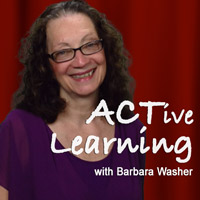| 6 , 7 , 8 | |
| Theater | Science English |
| Grade Level Program | Integration |
| 5 | 60 min |
|
Five, 60-90 minute sessions with a Sharing or other culminating project for individual classes or the entire grade level during Session 5 Classes are typically held once a week. However, at the discretion of the Language Arts Teacher, the program may be completed in 1 or 2 weeks or spread out to allow time in between sessions for completion of classroom activities/assignments designed by the Teaching Artist with the Classroom Teacher. *If the school calendar does not allow for 5 visits, the Teaching Artist can provide an adjusted version of the residency with 3 or 4 sessions. |
|
| In-School Short Term Residency | |
| All year | |
| $10 | 0 |
| yes | In-Person |
|
Props needed for Drama activities to supplement available classroom resources Originals for handouts or prompts to be used with activities during program sessions or for follow-up/reflection in the classroom between sessions to deepen student learning (ex. Seeing a Sport, Listening to the Environment, Identifying an Object, What Am I Listening To?, What's That Food?, Trust Walk Observations) |
|
|
Easel and large pad of paper with markers Paper (unlined) and Pencil for each student Copies of handouts for students as needed |
|
|
Open space in classroom or multi-purpose space large enough for entire class to participate on their feet simultaneously or spread out to work in small groups Access to tables/desks and chairs for writing and/or drawing related to the activities An accessible outdoor space near the building for sensory exploration If selecting a Sharing for the entire grade, will need a large enough space for all classes to meet together to present and view. Could be a stage, but not required. Should be scheduled for each class to use in Session 4 and for the entire grade for Session 5. |
|
|
I can demonstrate focus, concentration and sensory awareness by using two or more of my 5 senses to fully explore an environment or object. I can use sensory recall and appropriate grade-level vocabulary to vividly describe a sensory experience by speaking, writing or drawing/labeling and share my observations with a partner. I can use precise words, phrases and sensory language to add at least 3 relevant details describing a location, character, experience or event in a written narrative or poem or add at least 3 concrete details or examples to improve accuracy in a written report or informational text. |
|
|
Writing well "“ It"s in the details! In Vivid Vocab, improvisational theatre activities enable students to harness the power of words and successfully meet the constant request to "add more details" to their writing. Drama naturally nurtures self-regulation skills as students initially work "alone together" focusing on their own participation, allowing others to do the same. The experiences heighten sensory awareness, expand sensory recall and stimulate imagination/creativity "“ providing the tools and practice needed to discover and describe the world. Each session offers a balance of ease and challenge, choice and structure, movement and table work, individual exploration and group collaboration - ideal for building skills throughout the creative process. What students will do: Students learn to turn off their "auto-pilot" , focus their attention and actively engage with the environment. As observation skills develop, students recall and reflect by writing, drawing or speaking. Sharing with partners or in small groups, participants give/receive feedback, make revisions, improve vocabulary and add vivid detail to their writing, both fiction and nonfiction. Ultimately, students incorporate sensory details from their observations into writing a poem, story or descriptive paragraph. Alternatively, the experience can be designed to help students discover relevant facts and concrete details to use in writing an effective essay, historical narrative or scientific report. The Teaching Artist incorporates tips from Reader"s Theatre and Public Speaking to support every individual as each presents a selected portion of their work to the class. *Students take personal pride in their original work. *Teachers note even those who "never talk in class" are willing to share. The residency stands alone or can be part of a larger long-term project. Teachers choose writing assignments that meet the specific needs of their students. * See Additional Notes for Sample Projects |
|
|
Sample Projects developed with Language Arts Teachers: Enhancing paragraphs describing locations in student novels written for NaNoWriMo Young Writers Program Writing and illustrating original Haikus Analyzing imagery and details in poetry Incorporating details into developing Science Fair projects and writing/presenting reports for a variety of topics At least one of the activities is best done outdoors, weather permitting. *All ACTive Learning Through Drama programs have been developed and implemented by a professional Theatre Educator in collaboration with Classroom Teachers and Arts Specialists. |
|
|
1-3 are welcome, if the classroom teacher desires. .
|
|
Grade 6 |
||||
|
||||
Grade 7 |
||||
|
||||
Grade 8 |
||||
|

